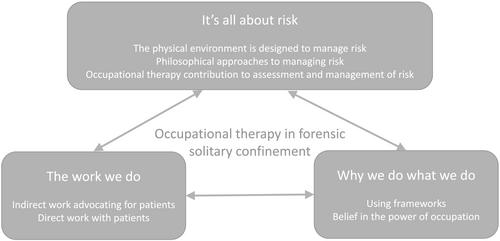Occupational therapy with patients in forensic solitary confinement: A qualitative study
Abstract
Introduction
Occupational therapists work with forensic mental health patients in solitary confinement to counter impacts of mental illness and occupational deprivation, to promote well-being and support transition to less restricted environments. There is little literature describing occupational therapy in this context. This study aimed to explore and describe the work, context and professional reasoning of occupational therapists working in solitary confinement settings within a large forensic mental health service in Victoria, Australia.
Methods
A qualitative design used semi-structured interviews with 11 occupational therapists and reflexive thematic analysis.
Findings
Three central organising themes, it's all about risk, the work we do and why we do what we do, provided rich description of the context and work of occupational therapists in solitary confinement settings, including approaches used to engage patients in occupation and how the Model of Human Occupation and recovery principles informed their professional reasoning. Despite the setting restrictions, participants engaged in core elements of the occupational therapy practice process and described creative work that offered patients choice and meaningful occupation. They described occupational enrichment to address occupational deprivation and create opportunities for change within the highly restrictive and risk-focussed environment of solitary confinement. Assessment was mainly unstructured, and the need for better evaluation of therapy outcomes acknowledged. Goal setting often focussed on immediate needs. Working in a risk-focussed environment influenced participants' professional reasoning and work with patients, and while they advocated for occupational opportunities for patients, frustration was experienced in response to limits to occupational therapy involvement in risk assessment.
Conclusion
The findings address a gap in the literature about the work of occupational therapists in forensic solitary confinement. Though participants' reasoning was informed by occupational and recovery principles, and they described working in occupation-based ways, they did not always articulate explicit connections between theory and practice.


 求助内容:
求助内容: 应助结果提醒方式:
应助结果提醒方式:


